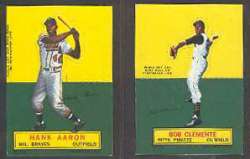Below are short bits & pieces on sportscard & baseball trading card collecting.
Please wander around the website for more info, prices, values & images
on vintage baseball, football, basketball, hockey, sport and non-sports cards.


1964 Topps Stand-Ups
Checklist & Values
One of Topps most popular 1960's test issues !!!
Blank-backed, unnumbered & standard size - cards were called
"Stand-Ups". "Stand-Ups" refers to a type of card that was die cut around
the player's picture. The background could be folded so the player's picture
could "stand up" alone.
1934-36 Batter Up and the 1951 Topps All-Star sets are 2 other popular
stand-up issues.
22 of the 77 cards are single prints making them twice as scarce and much
higher in demand.
Thanks to the green and yellow borders and that most cards have been folded,
1964 Stand-Ups extremely difficult to obtain in high grade.

 On the left and right are images of a pack and box.
Set packed with 19 Hall-of-Famers including the Top-5: Mickey Mantle,
Willie Mays, Roberto Clemente, Hank Aaron & Sandy Koufax.
On the left and right are images of a pack and box.
Set packed with 19 Hall-of-Famers including the Top-5: Mickey Mantle,
Willie Mays, Roberto Clemente, Hank Aaron & Sandy Koufax.
Click for complete
1964 Topps Stand-Ups checklist and prices
Note: You may be on that page right now.
|
1



|
1955 / 1959 / 1960 Armour Hot Dog Coins
Checklist & Values

As a kid I loved shopping with mom hoping to find my next favorite
food - the one with baseball cards !!!
In 1955,1959 & 1960, kids could enjoy hot dogs with their cards
thanks to Armour's coins in 1955, 1959 & 1960.
The 1-1/2 inch plastic coins, almost the same each year, came in
many colors with several rare and perhaps even 1-of-1,
making a "master" set almost impossible.
Add in the variations and you can imagine the task.
See sportscollectorsdaily for great 1955,1959 & 1960 Armour baseball
coins article.
Click for complete
1955/1959/1960 Armour Baseball Coins
Checklist & Values
|

Team Autographed / Signed Baseballs
Team signed baseballs were the thing well before single-signed
balls exploded on the market.
What is a "Team Signed Baseball" ???
Simple answer: A ball with XXX signatures of a certain team
for a certain year. What is difficult is the XXX.
Baseball tons of roster moves make it nearly impossible to
"Get Them All".
Generally, team signed baseballs from early 1900's had 10 to 15
signatures, the 1940's that jumped to 18 to 25.
Joyce Sports Research Collection (Notre Dame) says "signatures must
include only members of a specific team from a specific year, and there
must be some approximation of completeness."
Not concrete but to me a "team ball" MUST have ALL the team's
STARS (unless a rookie or in season trade) and in today's market
at least 20, preferably more, and the manager.
Determining Age of Team Signed Balls
"Official" league balls have stamped signatures of current league
presidents on the "sweet spot".
Starting 1934/1935 balls were produced by Spalding (NL)
and Reach (AL). Rawlings took over in 1977/78.
Have a possible team roster at hand, ESPN & baseball-reference.com
have great sites), decipher a few signatures then solve the puzzle.
Note: You may be on that page now.
|

Baseball card collecting terms (part G)
Grade/Condition Centering, corner wear, photo clarity, edges,
creases, print flaws ... all combine to determine a card's condition or grade.
Along with rarity/scarcity it is the major factor in a card's value.
Graded Card As values increased the condition of cards and the
determination of fakes and alterations became increasingly more important.
Various companies became "graders" of your cards. For a fee they would grade
your card (usually on a 1 to 10 scale) and then placed in a sealed plastic
holder with labelling of the vital information.
From past experiences, most people are NOT HAPPY with the grades they receive.
To keep values up, graders can be extremely picky. Things you don't see,
they do so don't be surprized when the NEAR MINT card you send in ends up
with an EX or EX/MINT grade.
There are TOO many grading companies - if you do, do choose carefully.
PSA / SGC / GAI / BGS are some of the many companies.
It is good to know that getting a card graded by a company that people
do not recognize or respect will usually just cost you time and money
and not help you in any way.
© 1995-2019 "InterNet's Baseball Card Store" / Joseph Juhasz ... All Rights Reserved
|








